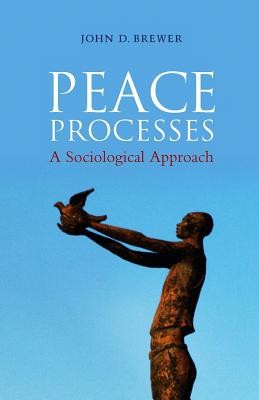
- We will send in 10–14 business days.
- Author: John D Brewer
- Publisher: Polity Press
- ISBN-10: 0745647766
- ISBN-13: 9780745647760
- Format: 15.8 x 22.9 x 2.5 cm, hardcover
- Language: English
- SAVE -10% with code: EXTRA
Reviews
Description
Peace processes are mostly very fragile. This engagingly written book takes a bold new approach to the topic by beginning from the premise that sociology can identify those factors that help to stabilize them.
The book draws a distinction between the political and social dimensions of peace processes, arguing that each is dependent on the other. Consideration of the social peace process, neglected in conventional treatments of the subject, is made central to this volume. While complementing current approaches that emphasize institutional reform in politics, law and economics, it pays due attention to sociological factors such as gender, civil society, religion, the deconstruction of violent masculinities, restorative justice, emotions, hope, forgiveness, truth recovery, social memory and public victimhood. These important themes are fully illustrated with examples and in-depth case studies from across the globe.
The book locates itself within the growing debate about the positive impact of global civil society on peace and identifies the new forms of peace work engendered by globalization. It will be essential reading for students and scholars of peace studies in politics, international relations and sociology departments.
EXTRA 10 % discount with code: EXTRA
The promotion ends in 21d.01:58:44
The discount code is valid when purchasing from 10 €. Discounts do not stack.
- Author: John D Brewer
- Publisher: Polity Press
- ISBN-10: 0745647766
- ISBN-13: 9780745647760
- Format: 15.8 x 22.9 x 2.5 cm, hardcover
- Language: English English
Peace processes are mostly very fragile. This engagingly written book takes a bold new approach to the topic by beginning from the premise that sociology can identify those factors that help to stabilize them.
The book draws a distinction between the political and social dimensions of peace processes, arguing that each is dependent on the other. Consideration of the social peace process, neglected in conventional treatments of the subject, is made central to this volume. While complementing current approaches that emphasize institutional reform in politics, law and economics, it pays due attention to sociological factors such as gender, civil society, religion, the deconstruction of violent masculinities, restorative justice, emotions, hope, forgiveness, truth recovery, social memory and public victimhood. These important themes are fully illustrated with examples and in-depth case studies from across the globe.
The book locates itself within the growing debate about the positive impact of global civil society on peace and identifies the new forms of peace work engendered by globalization. It will be essential reading for students and scholars of peace studies in politics, international relations and sociology departments.


Reviews